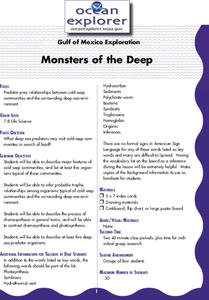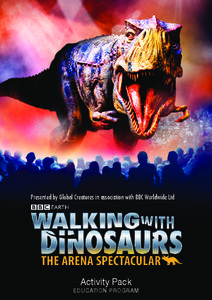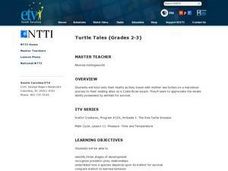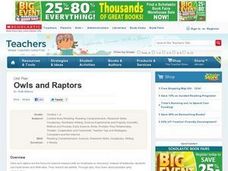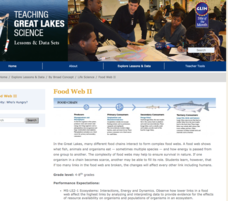Howard Hughes Medical Institute
Modeling Trophic Cascades
In the ecological game of who eats who, one small change can have a big impact! Individuals create food chains in an array of ecosystems, then determine what happens to organisms in the chain when one organism changes its feeding...
NOAA
Understanding Food Chains and Food Webs
Jump into an exploration of marine ecosystems with the first lesson in this four-part series. After first learning about crustaceans, mollusks, and other forms of sea life, young marine biologists view a PowerPoint presentation that...
American Museum of Natural History
What's This? Colorful Creatures
An online resource shows learners some species that are very good at using their camouflage as well as other ways species use their coloring for survival. Interactive and digital, the lesson is perfect as a remote learning resource.
Ask a Biologist
It’s a Plankton Eat Plankton World
For as small as they are, plankton sure play an enormous role in maintaining marine ecosystems. Dive into an investigation of these tiny organisms with a hands-on life science activity in which children cut out pictures of sea animals...
Curated OER
Monsters of the Deep
Students describe major features of cold seep communities, and list at least five organisms typical of these communities. They infer probable trophic relationships among organisms typical of cold-seep communities.
National Wildlife Federation
Who Is Faster?
Am I going to catch it? Individuals time how long it takes them to walk, jog, and run a given distance and calculate their speed. They then research two animals and find their speeds. Using a chart, pupils compare the speeds of the...
BBC
Walking with Dinosaurs
Breath new life into your class's study of dinosaurs with this extensive collection of materials. Offering everything from a printable T-rex mask, word searches, and connect-the-dots activities to informational handouts, hands-on...
American Museum of Natural History
What's This? Leeches
Who actually likes leeches? Meet a scientist that makes his living letting leeches feed on him. Pupils learn about the characteristics of leeches and different variations of the species. The lesson works as a remote learning resource or...
Curated OER
Web of Predators and Prey
Middle schoolers investigate the food chain by researching the Internet. For this ecosystem lesson, students view the video "Competitor and Predator" and read a book from the series "The Magic School Bus." Middle schoolers utilize a...
Curated OER
The Frog and the Ol' Black Fly
Students explore frogs. For this cross curriculum literacy and frogs lesson, students predict the plot and then listen to the book The Wide-Mouthed Frog by Keith Faulkner. Students define "predator" and identify foods a frog might eat. ...
It's About Time
Who Eats Whom?
Packed with visual aids and multiple learning opportunities, an engaging exercise challenges individuals as they explore the role of producers, consumers, and decomposers. After discussing differences between food chains, food...
Curated OER
EcoFluxx
Students describe examples of predator/prey relationships in nature explain how some animals protect themselves from predation better follow all directions presented to them become more flexible, adaptable and literate learners. They...
Curated OER
Turtle Tales
Young scholars watch videos and fill out worksheets about the turtles and their journey to the Costa Rican beach. In this turtles lesson plan, students learn and discuss survival, predator and prey, and stages of development.
Curated OER
Amazon Food Chain
Explore food chains in the Amazon Rainforest using this resource. Learners discuss the predator vs. prey relationships in the food chain. Then, they create a food web to describe this relationship. This is a simple and effective way to...
Curated OER
How Many Birds Would It Take To Keep A Jackal Alive?
Middle schoolers examine the role of large families in some animal populations. They work together to complete an activity related to food supply. They discover the relationship between preys and predators.
Curated OER
Native Species Restoration and its Impact on Local Populations
Students explore how predators help control the growth of prey species for a more balanced ecosystem.
Curated OER
Wetlands - Food Web Relationships
In this food web relationships instructional activity, students click on the links to learn about the food web relationships in the wetlands and answer short answer questions about it. Students complete 8 questions total.
Curated OER
Laws of the Jungle
Pupils build a video game on predator-prey relationship. In this biology lesson, students identify the variables that affect this relationship. They write a short description and play each other's game.
Curated OER
Owls and Raptors
Students investigate the predator-prey relationship of owls and raptors. They examine a variety of resources about owls and raptors, develop a list of vocabulary words, dissect owl pellets and identify what owls eat, and play a...
Kentucky School for the Deaf
Levels of Organization within an Ecosystem
From tiny organisms to entire biomes, young scientists examine the interdependent relationships tying all living and non-living things together with this collection of ecology resources.
Curated OER
Competition/Cooperation Relationships
Students view the PowerPoint slide of a lynx and hare and discuss what would happen if all the lynxes were destroyed. They then take notes on the lesson and brainstorm about other competitive/cooperative relationships as well as discuss...
Curated OER
The Ultimate Predator
Students already know that the most effective predator on earth today. They pay close attention, because after the teacher have finished lecturing, their assignment is to design a new "Ultimate Predator." Students present their...
Curated OER
GPS Ecosystem (Ecotone) Scavenger Hunt
Students describe the characteristics of an ecotone. In this ecotone lesson, students pick out their area and describe the visual appearance, conditions, ecosystem, biodiversity, predators, prey, and trees in their ecotone. They create a...
Michigan Sea Grant
Food Web II
A food web consists of complex food chains and the more complex the web, the better likelihood of survival. Learners compare and contrast food webs and food chains and discuss concepts like the predator-prey and consumer-producer...






